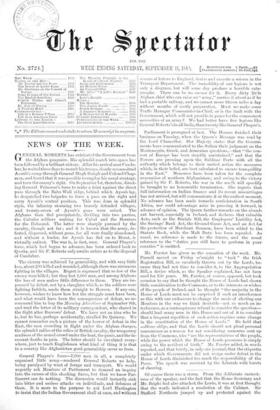Mr. Forster has given us the sensation of the week.
Mr. Parnell moved on Friday se'nnight to " tack " the Irish Registration Bill, so cavalierly thrown out by the Lords, be- cause they had not time to consider it, to the Appropriation Bill, a device which, as the Speaker explained, has not been used for 150 years. Mr. Forster, of course, opposed, but took occasion to say that he thought the House of Lords had shown. little consideration to the Commons, or to the interests or wishes of the people of Ireland, and he thought " the majority in the House of Lords must not be surprised if such an interference as this with our endeavour to change the mode of electing our Members in the way we think desirable—not so much an in- terference, as a contemptuous refusal to consider the question— should lead many men in this House and out of it to consider that a frequent repetition of such action requires some change in the constitution of the House of Lords." He held that noblesse oblige, and that the Lords should not plead personal convenience as a reason for not considering measures sent up from the Commons, who " are the representatives of the people, while the power which the House of Lords possesses is simply owing to the accident of birth." Mr. Forster added, in words reported, and that briefly, in only one journal, that the etiquette under which Governments did not resign under defeat in the House of Lords diminished too much the responsibility of the Peers. The speech was received by the Liberals with bursts of cheering.


































